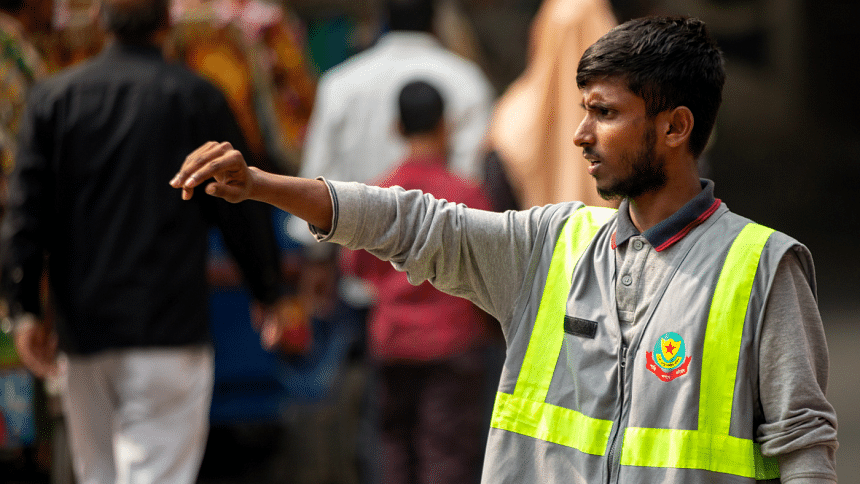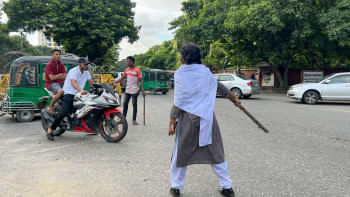Managing traffic through student involvement

If you've been out and about near high-congestion areas around the capital recently, you may have come across young people in reflective vests aiding traffic control alongside the police. Since the early days of November, approximately 300 students have been working in morning and evening shifts to help alleviate the city's growing traffic jam issues.
This initiative began following an announcement on October 30 by Labour, Employment, and Youth and Sports Adviser Asif Mahmud Sajib Bhuiyan, who stated that 700 students would be recruited as support staff for the traffic police and would receive a designated honorarium for their efforts.
Ebrahim Khalil, student of Vashantek Govt. College, went to the Rajarbag Police Station to apply for the position. Regarding the selection process, he said, "Participants got their height and weight measured and were also asked to run a marathon. SSC results also played a role as they preferred candidates with good academic records. Around 180-190 students were selected alongside me after approximately 300-400 showed up for the selection."
On the other hand, Shafi Bin Sultan, an eleventh grader from St Joseph Higher Secondary School, said, "11 students were chosen from our school's scout group. The candidates were nominated by our school authority based on their leadership abilities, effective communication skills, and capacity to handle situations in stressful environments."
The selected students have been working in one of two daily shifts: morning shifts from 8 AM to 12 PM, or evening shifts from 4 PM to 8 PM. These four-hour shifts were designed to ensure sufficient staff presence on the roads during peak traffic hours. Students' placement for specific shifts and locations was generally determined by the traffic police, with flexibility allowed for shift adjustments as needed.
Ebrahim shared, "We were added to a group chat where we could introduce ourselves by our provided 'tag number' if we wanted to swap our shifts."

As for responsibilities, the students were primarily tasked with checking ongoing vehicles' papers, stopping incoming traffic to let other lanes through, ensuring bikers were wearing helmets and weren't overloading bikes, and so on. All the students we spoke to shared positive experiences, especially highlighting the supportive attitudes they received from both pedestrians and drivers.
Saniya Akter Pinky, a student of Dhaka State College, shared how surprisingly uplifting the entire experience has been for her. "Our country's streets are known to be quite unsafe for women," she said. "However, my experience at work has been far from what anyone might have anticipated. As of now, I have not heard a single demeaning comment or been catcalled by bystanders."
She continued, "I am overwhelmed by the support and care that I am showered by the locals during my duty. Moreover, trying to find a clean washroom as a woman has always been a struggle. But, thankfully, every single traffic police box in my area is equipped with usable washrooms which makes my entire work experience even smoother. We are also encouraged to take regular breaks and are supplied with drinking water by the police department."
Her sentiments were reiterated by Shafi, who found the experience to be mostly smooth. "Being engaged in such impactful community work has truly been a rewarding experience," he claims. "The response from the public was very positive; people showed respect toward us and willingly cooperated. When we pointed out certain issues in people's documents or helmets, they quickly apologised, promising to follow the laws thereafter."
For Ebrahim, this experience held additional weight, as his future goals align with the work he has been doing over the past few weeks. He states, "I plan to join the police force when I grow up, so this opportunity to work closely with law enforcement officers has given me an insight into what I want to do for my future career."
In recognition of their valuable contributions, students are set to receive BDT 500 for every shift. Talking about the honorarium structure and mode of payment, Pinky said, "Students were given the option to either get paid for each shift as they ended or receive the entire month's payment at the end of the month. Most of us preferred to receive our payment at the end of the month."
She then explained that this preference stemmed from the desire to receive a lump sum at the month's end, which many planned to use for more beneficial purposes. "Getting paid after each shift could have led to impulsive spending," she added. "After all, the amount isn't insignificant. A student working for 30 consecutive days can earn as much as 15,000 Taka."
Community policing involves engaging ordinary citizens in the law enforcement process, a model already well-established in developed countries like Japan.
Muhammed Ayub, Project Management Professional (PMP), Superintendent of Police for Bangladesh Police, described the initiative as "a win-win for everyone involved." He explained, "Engaging students in community service like this encourages them to become proactive, law-abiding citizens while giving them a unique perspective on the importance of following traffic rules."

Ayub added that by taking on the responsibilities of maintaining order firsthand, students gain a deeper understanding of the need for safety and the role they can play in reducing traffic congestion. He further noted, "Pedestrians and drivers often respond more positively to students, viewing them as peers or younger family members, compared to uniformed traffic police."
Expressing confidence in the programme's potential, he stated, "I am sure that the involvement of students in the roads will significantly improve Dhaka's traffic situation."
Another benefit of this initiative lies in the promise that students who participate in this will have the option to transition into permanent positions upon completing their studies, if they express interest. Involving youngsters in such initiatives also helps them build a sense of responsibility and develop essential leadership skills. Additionally, it bridges the gap between the public and authorities, fostering trust among all stakeholders.
However, in order to maximise the effectiveness of this effort, it is crucial for the authorities to gradually expand the range of internship opportunities available. While such physically intensive jobs are obviously important, internships in fields such as municipal planning, public policy research, community health programmes, and environmental conservation projects, among others, can provide valuable hands-on experiences. These opportunities will not only prepare young individuals to address real-world challenges but also equip them to lead with confidence and competence.
Reference:
Dhaka Tribune (October 30, 2024). 700 students to join Dhaka's traffic management, to get honorarium
Ayaan immerses himself in dinosaur comics and poorly-written manga. Recommend your least favourite reads at [email protected]
Tazrin is a finance and banking student at Bangladesh University of Professionals (BUP). Send her well wishes at [email protected]

 For all latest news, follow The Daily Star's Google News channel.
For all latest news, follow The Daily Star's Google News channel. 










Comments